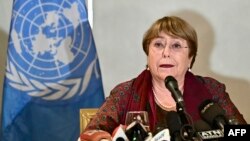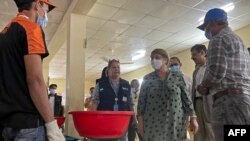The U.N. high commissioner for human rights called Wednesday for the Bangladesh government to establish “an impartial, independent and transparent investigation” into allegations of enforced disappearances, extrajudicial killing and torture.
At a press conference concluding her four-day visit to Bangladesh, Michelle Bachelet also urged the South Asian nation’s government to ratify the International Convention for the Protection of all Persons from Enforced Disappearance.
“Bangladesh is party to all the core U.N. human rights treaties, except for it,” she said, adding that there are “continued, alarming allegations of both short-term and long-term enforced disappearances, and concerns about the lack of due process and judicial safeguards.”
Bachelet said inviting the U.N. Working Group on Enforced Disappearances to visit Bangladesh would “show a commitment to decisively address this issue.”
The U.N. rights chief came to Bangladesh on Sunday and has met with Prime Minister Sheikh Hasina, several other ministers, civil society, rights activists and the families of alleged victims of rights violations.
She also visited the Rohingya refugee camps in the southern district of Cox’s Bazar and met Rohingyas who fled to Bangladesh in the face of persecution and killings by the Myanmar military, which the U.N. says were conducted with “genocidal intent.”
On Wednesday, she appeared at a press conference in a Dhaka hotel to discuss her findings.
Probe of rights violations
Bachelet told journalists that she raised her deep concern about the serious allegations of enforced disappearances, extrajudicial killings and torture with government ministers.
She called on ministers to establish a “more specialized mechanism that works closely with victims, families and civil society to investigate allegations of enforced disappearances and extrajudicial killings,” given the “long-standing frustrations at the lack of progress in investigations and other obstacles to justice.”
On Monday, several Bangladeshi rights activists urged Bachelet to impress upon the government the need for an independent commission to investigate extrajudicial killings and enforced disappearances.
When asked her opinion about such a commission, she said different countries have different mechanisms to deal with human rights violations.
“Some commissions can be judicial whereas some can be independent. There is no one-size-fits-all solution,” she said, adding that for such a commission to be successful it would be to have a “clear mandate, resources, independence and power to do the job.”
“My office is ready to provide advice on how such a body could be designed in line with international standards,” she added.
Civic, political capacity
Bachelet told journalists that successive U.N. human rights reports have documented “a narrowing of civic space, increased surveillance, intimidation and reprisals often leading to self-censorship” in Bangladesh.
“When you want to be graduated from the status of Least Developed Countries, it’s not just about improving your GDP. It’s also about strengthening the capacity of your civic institutions,” she said in reply to a question.
For Bangladesh to aim for the next level of development, Bachelet said, it is essential to ensure a “democratic and civic space, as well as effective checks and balances and accountability.”
Referring to a national election scheduled for next year, she said it would be an important time for Bangladesh to maximize the civic and political space, including freedom of expression, association and peaceful assembly of political activists, human rights defenders, opposition parties and journalists.
“It is also important to ensure that law enforcement forces have the necessary training to manage protests without resorting to the excessive use of force," she said.
Bachelet was asked about Bangladesh’s Digital Security Act, which the Sheikh Hasina government passed in 2018 and has used to jail politicians, journalists and others.
Bachelet said she recognized a need to “regulate the online space, addressing online hate speech, disinformation and combating cybercrime.” But she said her office had submitted recommendations to the Bangladesh government “for repeal and revision of certain provisions of the act, with a view to ensuring their compliance with international human rights laws and standards and preventing arbitrary application or misuse.”
Hopes for Rohingya?
Bachelet welcomed the Bangladesh government’s “impressive effort” in hosting hundreds of thousands of Rohingya refugees who fled persecution in neighboring Myanmar in 2017. “The importance of Bangladesh’s humanitarian contribution — and its historical significance — cannot be overstated,” she said.
But she expressed worries about increasing anti-Rohingya rhetoric in Bangladesh and the stereotyping and scapegoating of Rohingyas as the source of crime and other problems.
“I call on the government and all Bangladeshis to be vigilant against such harmful rhetoric, to actively counter misinformation with facts, and to foster understanding with the host communities,” she said.
She also called on the government to expand “education and livelihood opportunities” to the children in the camps.
"I was heartened to see young girls and boys at learning centers [who] attended lively maths and Burmese classes taught by community members,” she said. But while the younger children were energized and spoke of their aspirations for their future, she said, the older Rohingya children expressed their frustration at a lack of education facilities.
“Expanding education and livelihood opportunities” for these older Rohingya girls and boys “will be the best way to prevent social problems and criminality and to fully prepare refugees for sustainable reintegration in Myanmar society,” she said.
Bachelet said the current situation in Myanmar is not right for the repatriation of Rohingyas. “Repatriation must always be conducted in a voluntary and dignified manner, only when safe and sustainable conditions exist in Myanmar,” she said.





